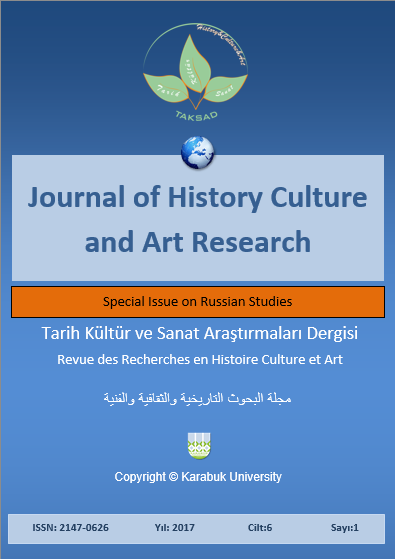Metaphors in Media Discourse on Migration
DOI:
https://doi.org/10.7596/taksad.v6i5.1242Keywords:
Linguistics, Discourse of mass media, Sphere of concepts, Metaphor, Comparative typology, Migration.Abstract
The paper deals with the problems of cognitive linguistic discourse and comparative analysis studies of metaphor as a means of representing migration in mass media. It presents the most productive metaphoric models, shaping the concept of “migration”, that function in printed and electronic media discourses of Great Britain, USA and Russia in 2016-2017. A comparative analysis of metaphorical models representing migration in British, American and Russian media discourses has shown that in media discourses on the migration of 2016-2017, regularly three high-frequency and productive metaphorical models operate: hydronymic, military and morbid. Images of these metaphorical models are united by vectors of anxiety, despair, threats to life and have negative conceptual potential.
References
Baranov, A. N. & Karaulov, Yu. N. (1994). Dictionary of Russian Political Metaphors. Moscow: Pomovsky and partners. [In Russian].
Budaev, E. V. & Chudinov, A. P. (2008). Metaphor in political communication: monograph. Moscow: Flinta. [In Russian].
Chudinov, A. P. (2001). Russia in the metaphorical representation: Cognitive studies of political metaphor (1991-2000): monograph. Ekaterinburg: Ural.gos.ped.un-t. [In Russian].
Donald Trump in Fox Business 2016 GOP primary debate. Available at: http://www.ontheissues.org/Archive/2016_FoxBiz_GOP_Donald_Trump.htm
Gavrilov, A. A. (2013). Linguistic means used in mass media to influence public consciousness. Omsky nauchny vestnik, 1(115), 99-103. [In Russian].
Kalygina, M. Yu. (2009). Metaphorical representation of migration in media discourse of Russia, Great Britain and the USA. Political linguistics, 29, 109-113. [In Russian].
Kubryakova, E. S. & Tsurikova, L. V. (2008). Verbal activity of mass media as a specific type of discourse. Language of mass media: manual for graduate students, (pp. 183-209). Moscow: Akademichesky Proyekt, Alma Mater. [In Russian].
Lakoff, G. & Johnson, M. (2004). Metaphors We Live By. Moscow: Editorial URSS. [In Russian].
President Obama’s Speech on Immigration Reform. Available at: http://thenews-chronicle.com/full-transcript-president-obamas-speech-on-immigration-reform/
Rybakovsky, L. L. (ed.) (2003). Demographic Concepts Dictionary. Мoscow: CSP. [In Russian].
Sklyarovskaya, G. N. (ed.) (2006). The Explanatory Dictionary of the Russian Language of the beginning of the 21st century. Actual Vocabulary. Moscow: Eksmo. [In Russian].
Vesnina, L. E. (2010). Metaphorical Modeling of Migration (based on the Russian printed media and association experiment data). Dissertation in Philology. Ekaterinburg. [In Russian].
Vinogradov, S. I. (1999). Expressive means in parliamentary speech. Culture of parliamentary speech, (pp. 66-77). Moscow: Nauka. [In Russian].
Volodina, M. N. (2008). Language of mass media: the main tool of influencing the public consciousness. Language of mass media: manual for graduate students, (pp. 6-24). Moscow: Akademichesky Proyekt, Alma Mater. [In Russian].
Downloads
Published
How to Cite
Issue
Section
License
All papers licensed under Creative Commons 4.0 CC-BY.- Share — copy and redistribute the material in any medium or format
- Adapt — remix, transform, and build upon the material for any purpose, even commercially.
Under the following terms:
Attribution — You must give appropriate credit, provide a link to the license, and indicate if changes were made. You may do so in any reasonable manner, but not in any way that suggests the licensor endorses you or your use.
- No additional restrictions — You may not apply legal terms or technological measures that legally restrict others from doing anything the license permits.







